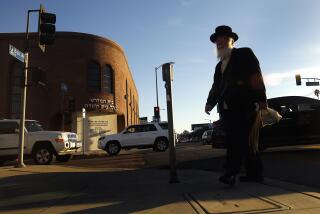Two Groups Strive to Bridge Cultural Gap
- Share via
Just when you think you’ve heard of every effort to bridge ethnic/religious diversity in Southern California, along comes an unexpected combination.
Without fanfare, members of Arab Christian and Messianic Jewish congregations will hold their ninth annual fellowship meeting in the San Gabriel Valley on Aug. 29.
Both are religious minorities within their ethnic heritages, but that does not prevent one group from harboring cultural prejudices about the other, leaders say.
“We overcome stereotypes by getting to know each other on a personal basis,” said Murray Silberling, whose Beth Emunah Messianic Synagogue in Agoura Hills co-sponsors the event that has drawn 200 to 300 people in recent years.
“We are not going to discuss politics--only Christ,” said the Rev. Jamil Fakhury, pastor of the host Arabic Evangelical Church of the Nazarene in Covina.
“Jesus Christ is the conciliator,” Fakhury said.
Indeed, Jesus, or Yeshua in Hebrew, is the focus of as many as 10 Messianic Jewish congregations that indicated they will have representatives at the fellowship.
Although congregations from Ahavat Zion in Beverly Hills to Shomrey Tzedek in Fullerton often have the look and sound of a traditional synagogue, their belief in Jesus as the Messiah--a Christian belief--and use of the New Testament set them apart.
*
To be sure, the evangelistic group Jews for Jesus and the messianic congregations have been a source of controversy in Jewish communities.
“According to tradition, Jews who become Christian are apostate Jews,” said Rabbi Gary Greenebaum of Los Angeles, regional director of the American Jewish Committee.
“The rabbis can say all they want that we are not Jewish,” countered Silberling, “but the people who come every weekend say, ‘This is Jewish.’ ” Silberling’s congregation, which moved from rented church space in Canoga Park a year ago to Agoura Hills, has grown from 100 to 140 members in that time, he said.
“We have people of all ages and backgrounds--American Jews raised in New York and Boston, Holocaust survivors and people raised in Israel or Morocco,” he said.
*
Relations between Arab Christians and the greater numbers of Arab Muslims are relatively cordial, experts say.
Christianity was long established in the Middle East before the spread of Islam began in the 7th century A.D. The vitality of Christian churches in Middle East countries has waned in recent decades because of emigration, but in the United States some prominent Arab leaders are of Christian background, not Muslim.
Two of the most quoted scholars on Islam are Yvonne Haddad of Georgetown University and Edward Said of Columbia University--both Christians.
When it has come to interfaith contacts in the Los Angeles area, Muslim and prominent Jewish figures have been leaders of the Interreligious Council of Southern California.
Contrary to a common misconception, not all Muslims are of Arab ancestry. But when crises have erupted in Israel and the Middle East, it has often been Dr. Maher Hathout of the Islamic Center of Southern California or Salam Al-Marayati of the Muslim Public Affairs Council--who are Egyptian and Iraqi, respectively--who have met with key rabbis to discuss issues, present joint statements and urge calm.
*
Less well known have been the yearly gatherings of Arab Christian congregations, whose memberships range from 50 to 150 people, and Messianic Jewish groups.
Two years ago, that fellowship met within days of the killing of Israeli Prime Minister Yitzhak Rabin by an ultra-Orthodox assassin. “The Arab people were sharing with us the loss,” Silberling said. “We were able to mourn and pray together for Israel as a nation.”
An Arab-Jewish dialogue--with religious and secular participants--was fostered in the Los Angeles area in 1986 by the Middle East Cousins Club, which recently evolved into the American Alliance of Arabs and Jews, said Don Bustany, past president of the Los Angeles chapter of the American-Arab Anti-Discrimination Committee.
Bustany, who also hosts “Middle East in Focus” on KPFK radio, had a Catholic upbringing but has “long since embraced a secular philosophy which includes all ethical beliefs,” he said.
But whatever the combination of people talking honestly and frankly, he said, “Any time that groups with different identities gather to talk, everybody benefits.”
More to Read
Sign up for Essential California
The most important California stories and recommendations in your inbox every morning.
You may occasionally receive promotional content from the Los Angeles Times.













